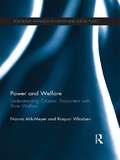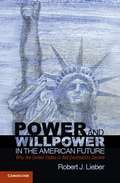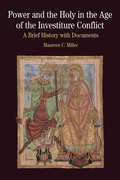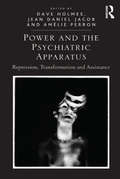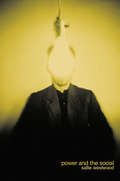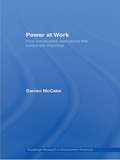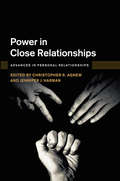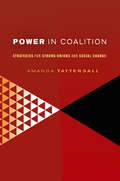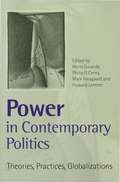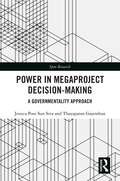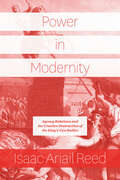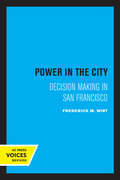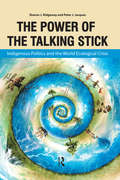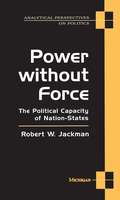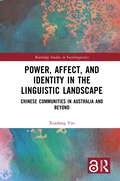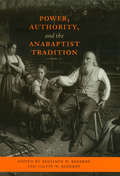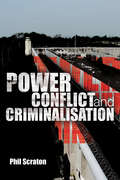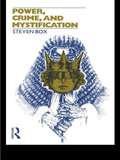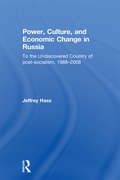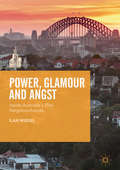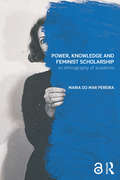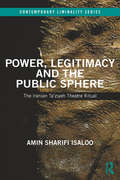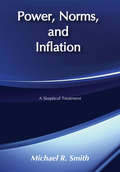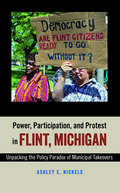- Table View
- List View
Power and Welfare: Understanding Citizens' Encounters with State Welfare (Social And Political Power Mup Ser.)
by Nanna Mik-Meyer Kaspar VillardsenIn the welfare provision of today, power takes both the shape of juridical sanctions and of attractive offers for self-development. When state institutions punish criminals, remove children at risk, or enforce sanctions upon welfare recipients the question of power is immediately urgent. It is less readily evident that power is at stake when institutions educate, counsel or ‘empower’ citizens. This book offers a framework for understanding and analyzing these complex and implicit forms of power at play in the encounters between citizens and welfare institutions. Taking as its starting point the idea that power takes many different shapes, and that different approaches to power may be necessary in the diverse contexts where citizens encounter welfare professionals, the book demonstrates how significant social theorists, spanning from Goffman to Foucault, can be used for inquiries into these encounters. Guiding the reader from their epistemological foundations to lucid ‘state of the art’ case examples, the book unpacks each of its six theoretical perspectives, and explains selected key concepts and explicates their potential for analysis. The final chapter discusses the usefulness of the theoretical approaches, their weaknesses and indicates some possibilities of theoretical integration. Including case studies of patients, nursing home residents, unemployed people, homeless people, and young offenders, from the USA, Denmark, France, Sweden, Canada, and Australia, Power and Welfare is designed for students and researchers of social policy, sociology, anthropology, political science, education, nursing and social work.
Power and Willpower in the American Future
by Robert J. LieberTo argue against the widely proclaimed idea of American decline, as this book does, might seem a lonely task. After all, the problems are real and serious. Yet if we take a longer view, much of the discourse about decline appears exaggerated, hyperbolic, and ahistorical. Why? First, because of the deep underlying strengths of the United States. These include not only size, population, demography, and resources, but also the scale and importance of its economy and financial markets, its scientific research and technology, its competitiveness, its military power, and its attractiveness to talented immigrants. Second, there is the weight of history and of American exceptionalism. Throughout its history, the United States has repeatedly faced and eventually overcome daunting challenges and crises. Contrary to a prevailing pessimism, there is nothing inevitable about American decline. Flexibility, adaptability, and the capacity for course correction provide the United States with a unique resilience that has proved invaluable in the past and will do so in the future. Ultimately, the ability to avoid serious decline is less a question of material factors than of policy, leadership, and political will.
Power and the Holy in the Age of the Investiture Conflict: A Brief History With Documents
by Maureen C. MillerHistorians tracing the emerging division between church and state in the West have long recognized the importance of the eleventh-century Gregorian reform movement and the investiture conflict — events that reached a dramatic climax in Pope Gregory VII’s excommunication of Emperor Henry IV. In her introduction to this ground-breaking volume, Miller recasts the narrative of reform and the investiture conflict — traditionally portrayed as an elitist struggle between church and state — in terms of a broad shift in conceptions of the nature of power and the holy. The volume brings together a wide selection of compelling documents — many of which have been largely unavailable — that allows students to place the investiture conflict within the wider context of social and political change in medieval Europe. Document headnotes, a chronology, a selected bibliography, and questions for consideration provide further pedagogical support.
Power and the Psychiatric Apparatus: Repression, Transformation and Assistance
by Dave Holmes Jean Daniel JacobDrawing on a broad range of approaches in the fields of sociology, anthropology, political science, history, philosophy, medicine and nursing, Power and the Psychiatric Apparatus exposes psychiatric practices that are mobilized along the continuum of repression, transformation and assistance. It critically examines taken for granted psychiatric practices both past and current, shedding light on the often political nature of psychiatry and reconceptualizing its central and sensitive issues through the radical theory of figures such as Foucault, Deleuze and Guattari, Goffman, and Szasz. As such, this ground-breaking collection embraces a broad understanding of psychiatric practices and engages the reader in a critical understanding of their effects, challenging the discipline’s altruistic rhetoric of therapy and problematizing the ways in which this is operationalized in practice. A comprehensive exploration of contested psychiatric practices in healthcare settings, this interdisciplinary volume brings together recent scholarship from the US, Canada, the UK, Europe and Australia, to provide a rich array of theoretical tools with which to engage with questions related to psychiatric power, discipline and control, while theorizing their workings in creative and imaginative ways.
Power and the Social
by Dr Sallie Westwood Sallie WestwoodLooking at the different ways power has been theorised from Hobbes to Giddens, this book analyzes the ways in which the theories have been applied. By bringing together theory and substantive analysis, this invaluable introductory text provides a clear and imaginative account of power and power relations. Processes and structures of power are analyzed within key areas of sociological concern, including:* the history of power* race* gender* class* sexuality* the spatial and visual.Investigating a wide range of cases from across the globe, including the 'underclass' in Britain, the power of the military in Latin America, the untouchables in India and the politics of new reproductive technologies, Dr Sallie Westwood adopts a popular approach to the subject, looking at the processes of power as well as structure and at how they function in everyday life.
Power at Work: How Employees Reproduce the Corporate Machine (Routledge Research In Employment Relations Ser.)
by Darren McCabeProviding detailed insights into working life, McCabe, a well known author in the fields of organization studies, labour process theory and critical management studies offers a distinctive approach to innovation in the work place. In this ethnography of a major US bank he argues that many innovations associated with thenew corporation seem to re
Power in Close Relationships (Advances in Personal Relationships)
by Christopher R. Agnew Jennifer J. HarmanPower is an inherent feature of social interactions, yet it is hard to define and therefore understand. This book is the first to organize current interdisciplinary theorizing and research about power from leading academics in areas such as social psychology, communications, family studies, and public health. It also focuses exclusively on how power operates and affects close relationship processes, while the theoretical insights provided point the way toward new lines of research and understanding. Using specific examples to illustrate complex theoretical explanations and supplying thorough descriptions of the existing literature on power in close relationships, this book is an essential resource for researchers, professionals, students, or laypeople seeking to better understand how power operates in those relationships that are most important to us.
Power in Coalition: Strategies for Strong Unions and Social Change
by Amanda TattersallThe labor movement sees coalitions as a key tool for union revitalization and social change, but there is little analysis of what makes them successful or the factors that make them fail. Amanda Tattersall-an organizer and labor scholar-addresses this gap in the first internationally comparative study of coalitions between unions and community organizations. Tattersall argues that coalition success must be measured by two criteria: whether campaigns produce social change and whether they sustain organizational strength over time. The book contributes new, practical frameworks and insights that will help guide union and community organizers across the globe. The book throws down the gauntlet to industrial relations scholars and labor organizers, making a compelling case for unions to build coalitions that wield "power with" community organizations. Tattersall presents three detailed case studies: the public education coalition in Sydney, the Ontario Health Coalition in Toronto, and the living wage campaign run by the Grassroots Collaborative in Chicago. Together they enable Tattersall to explore when and how coalition unionism is the best and most appropriate strategy for social change, organizational development, and union renewal. Power in Coalition presents clear lessons. She suggests that "less is more," because it is often easier to build stronger coalitions with fewer organizations making decisions and sharing resources. The role of the individual, she finds, is traditionally underestimated, even though a coalition's success depends on a leader's ability to broker relationships between organizations while developing the campaign's strategy. The crafting of goals that combine organizational interest and the public interest and take into account electoral politics are crucial elements of coalition success. For more about Power in Coalition, visit the author's wesbite: http://powerincoalition. com.
Power in Contemporary Politics: Theories, Practices, Globalizations
by Mark Haugaard Philip G. Cerny Howard H. Lentner Henri GoverdeThis major book provides an up-to-date and state-of-the-art overview of the contemporary theory and practice of the most central concept in political science: power. The concept of political power is introduced within a three-part framework: contemporary theories of power; applications of power processes and practices; and the implications of modern power flows across the globe today. The book explores the many structures of power in the contemporary world from theories of its construction and use, to its operation in policy networks, and its wider exercise at different levels in the political process, from the local to the global. Amongst the many themes explored are the reproduction and the legitimization of power, the dynamics of resistance and coercion, the concepts of private and public power, and the impact of globalization processes and subsequent shifting power arrangements. Combining diverse perspectives and different tools of analysis, this book represents the most comprehensive treatment of political power published in the last fifteen years. It will be essential reading for academics and students alike across political science, international studies and political sociology.
Power in Megaproject Decision-making: A Governmentality Approach (ISSN)
by Thayaparan Gajendran Jessica Pooi SivaThis research-based book critically examines the complex interplay of power relations in decision-making in megaprojects. This book is tailored for academics, students, practitioners, clients, and policymakers and addresses a significant gap in understanding how formal and informal power influences decision-making. Through applying governmentality theory and narrative inquiry from thirty-nine interviews, this book presents over sixty-five detailed stories offering a series of real-life narratives that expose the diverse forms of power at play in megaprojects. The stories reveal how deviations from norms can significantly impact project outcomes. This book uncovers the complex web of power relations, institutional norms, and individual actions driving decisions.This book provides a framework illustrating four behavioural contexts, entrepreneurial, box-ticking, deception, and recklessness, as manifestations of megaproject decision-making, providing readers with a tool to understand and navigate the intricate power dynamics in megaprojects.Readers will benefit from practical insights and strategies for fostering conducive decision-making environments, tailoring interventions to promote constructive behaviours, and mitigating harmful actions. This book is a resource for anyone seeking to grasp the complexities of megaproject management in the context of power relations, shaping their decision-making leading to success.
Power in Modernity: Agency Relations and the Creative Destruction of the King’s Two Bodies
by Isaac Ariail ReedIn Power in Modernity, Isaac Ariail Reed proposes a bold new theory of power that describes overlapping networks of delegation and domination. Chains of power and their representation, linking together groups and individuals across time and space, create a vast network of intersecting alliances, subordinations, redistributions, and violent exclusions. Reed traces the common action of “sending someone else to do something for you” as it expands outward into the hierarchies that control territories, persons, artifacts, minds, and money. He mobilizes this theory to investigate the onset of modernity in the Atlantic world, with a focus on rebellion, revolution, and state formation in colonial North America, the early American Republic, the English Civil War, and French Revolution. Modernity, Reed argues, dismantled the “King’s Two Bodies”—the monarch’s physical body and his ethereal, sacred second body that encompassed the body politic—as a schema of representation for forging power relations. Reed’s account then offers a new understanding of the democratic possibilities and violent exclusions forged in the name of “the people,” as revolutionaries sought new ways to secure delegation, build hierarchy, and attack alterity. Reconsidering the role of myth in modern politics, Reed proposes to see the creative destruction and eternal recurrence of the King’s Two Bodies as constitutive of the modern attitude, and thus as a new starting point for critical theory. Modernity poses in a new way an eternal human question: what does it mean to be the author of one’s own actions?
Power in the City: Decision Making in San Francisco (Institute of Governmental Studies, UC Berkeley)
by Frederick M. WirtSan Francisco is a uniquely favored city, but its politics are beset with extraordinary problems. Power is divided among traditional and new minorities, a mayor with modest authority, and a large city bureaucracy guided by insensitive professional norms. The special San Francisco "politics of profit" and ethnic conflict are complicated and profoundly influenced by such external forces as regional, state, and federal government, and by the force of a national economy. Frederick Wirt's fascinating study is based on personal interviews with knowledgeable observers and participants, on an extensive review of special reports, and on a firsthand study of the transaction patterns in the political, business, labor, ethnic, and historical life of the city. In the end, the 125-year political history of San Francisco provides solid new insights on the politics of large American cities in the 1970s. This title is part of UC Press's Voices Revived program, which commemorates University of California Press's mission to seek out and cultivate the brightest minds and give them voice, reach, and impact. Drawing on a backlist dating to 1893, Voices Revived makes high-quality, peer-reviewed scholarship accessible once again using print-on-demand technology. This title was originally published in 1974.
Power of the Talking Stick: Indigenous Politics and the World Ecological Crisis
by Sharon J Ridgeway Peter J JacquesThe Power of the Talking Stick makes the case that, reaching back to the beginning of the nation-state and all through the current period of corporate-led globalisation, our governments and social institutions have been engaged in activities that will ultimately extinguish the world's ecological life support systems. This book offers an alternative, listening to indigenous leaders and others whose voices often go unheard in the din of contemporary culture. Sharon Ridgeway and Peter Jacques offer a stark warning, but their insights are firmly grounded in traditional knowledge and provide a way to see past the politics and rescue the earth. An important resource for climate activists, students and academics.
Power without Force
by Robert W. JackmanExplores the ways states build political capacity; discusses how states learn to resolve conflict politically rather than violently
Power, Affect, and Identity in the Linguistic Landscape: Chinese Communities in Australia and Beyond (Routledge Studies in Sociolinguistics)
by Xiaofang YaoUncovering the complexity of linguistic diversity and semiotic creativity, this book examines the issues of power, affect, and identity in both physical and digital linguistic landscapes.Based on fieldwork with various Chinese communities in Australia, the book offers unique insights into the uses of languages, semiotic resources, and material objects in public spaces, and discusses the motives and ideologies that underline these linguistic and semiotic practices. Each chapter frames the sociolinguistic issue emerging from the linguistic landscape under investigation and shows readers how the personal trajectories of individuals, the availability of semiotic resources, and the historicity of spaces collectively shape the meanings of publicly displayed language items in offline and online spaces. Supported by a wealth of interviews, media, and archival data, the book not only advances readers’ understanding of how linguistic landscape is structured by various historical, political, and sociocultural factors, but also enables them to reimagine the linguistic landscape through the lens of emerging digital methods.This book is an ideal resource for researchers, advanced undergraduates, and graduate students of applied linguistics and sociolinguistics who are interested in the latest advances in linguistic landscape research within virtual and material contexts.
Power, Authority, and the Anabaptist Tradition (Center Books in Anabaptist Studies)
by Benjamin W. Redekop and Calvin W. RedekopFounded in part on a rejection of "worldly" power and the use of force, Anabaptism carried with it the promise of redemptive power. Yet the attempt to banish worldly power to the margins of the Christian community has been fraught with dilemmas, contradictions, and, at times, blatant abuses of authority. In this groundbreaking book, Benjamin W. Redekop, Calvin W. Redekop, and their coauthors draw on classic and contemporary thinking to confront the issue of power and authority in the Anabaptist-Mennonite community. From the power relationships of the sixteenth-century Peasants' War to issues of contemporary sexuality, the topics of Power, Authority, and the Anabaptist Tradition are sure to interest a wide audience.Contributors: Stephen C. Ainlay, College of the Holy Cross • J. Lawrence Burkholder, President Emeritus, Goshen College • Lydia Neufeld Harder, Toronto School of Theology • Joel Hartman, University of Missouri • Jacob A. Loewen, missionary, retired • Dorothy Yoder Nyce, Writer and former Assistant Professor, Goshen College • Lynda Nyce, Bluffton College • Wesley Prieb (deceased), former dean, Tabor College • Benjamin W. Redekop, Kettering University • Calvin W. Redekop, Conrad Grebel College, emeritus • James M. Stayer, Queen's University, Ontario
Power, Conflict and Criminalisation
by Phil ScratonDrawing on a body of empirical, qualitative work spanning three decades, this unique text traces the significance of critical social research and critical analyses in understanding some of the most significant and controversial issues in contemporary society. Focusing on central debates in the UK and Ireland – prison protests; inner-city uprisings; deaths in custody; women’s imprisonment; transition in the north of Ireland; the ‘crisis’ in childhood; the Hillsborough and Dunblane tragedies; and the ‘war on terror’ – Phil Scraton argues that ‘marginalisation’ and ‘criminalisation’ are social forces central to the application of state power and authority. Each case study demonstrates how structural relations of power, authority and legitimacy, establish the determining contexts of everyday life, social interaction and individual opportunity. This book explores the politics and ethics of critical social research, making a persuasive case for the application of critical theory to analysing the rule of law, its enforcement and the administration of criminal justice. It is indispensable for students in the fields of criminology, criminal justice and socio-legal studies, social policy and social work.
Power, Crime and Mystification
by Steven BoxFirst Published in 2004. Routledge is an imprint of Taylor & Francis, an informa company.
Power, Culture, and Economic Change in Russia: To the undiscovered country of post-socialism, 1988-2008
by Jeffrey K HassUtilising cutting-edge theory and unique data, this book examines the role of power, culture, and practice in Russia’s story of post-socialist economic change, and provides a framework for addressing general economic change. No other book places power and culture as centrally as this, and in doing so it provides new insights not only into how Russia came to its present state under Putin, but also how economies operate and change generally. In particular, the importance of remaking authority and culture - creating and contesting new categories and narratives of meaning - is shown as central to Russia’s story, and to the story of economies overall. Power, Culture and Economic Change in Russia is an excellent research tool for advanced undergraduate and postgraduate students of sociology, political science, economics, area studies, and other related disciplines.
Power, Glamour and Angst: Inside Australia's Elite Neighbourhoods (The Contemporary City)
by Ilan WieselPower, Glamour and Angst is about the social and cultural life of three Australian neighbourhoods – Toorak (Melbourne), Mosman (Sydney) and Cottesloe (Perth) - which are home to some of the nation’s wealthiest and most powerful citizens. The book explores how living in these neighbourhoods shapes the lifestyles, social networks and status of Australia’s elites. The book explores the everyday rituals through which residents produce their neighbourhood's status. It maps residents’ social networks and exposes the local institutions – including schools and sports or social clubs – in which access to such high-powered networks is granted or withheld. Power, Glamour and Angst examines how the collective social and cultural capitals of elite neighbourhoods are mobilised towards varied objectives, from initiation of business connections and opportunities, through to opposition against unwanted development or traffic, both sources of ongoing angst. Deeply conservative and resistant to change at their core, despite their wealth and power these communities have not always been successful in fully repressing external pressures. In the 21st century Australian city, even elite neighbourhoods must learn to adapt to population growth, urban densification and increased cultural diversity.
Power, Knowledge and Feminist Scholarship: An Ethnography of Academia (Transformations)
by Maria do Mar PereiraFeminist scholarship is sometimes dismissed as not quite ‘proper’ knowledge – it’s too political or subjective, many argue. But what are the boundaries of ‘proper’ knowledge? Who defines them, and how are they changing? How do feminists negotiate them? And how does this boundary-work affect women’s and gender studies, and its scholars’ and students’ lives? These are the questions tackled by this ground-breaking ethnography of academia inspired by feminist epistemology, Foucault, and science and technology studies. Drawing on data collected over a decade in Portugal and the UK, US and Scandinavia, this title explores different spaces of academic work and sociability, considering both official discourse and ‘corridor talk’. It links epistemic negotiations to the shifting political economy of academic labour, and situates the smallest (but fiercest) departmental negotiations within global relations of unequal academic exchange. Through these links, this timely volume also raises urgent questions about the current state and status of gender studies and the mood of contemporary academia. Indeed, its sobering, yet uplifting, discussion of that mood offers fresh insight into what it means to produce feminist work within neoliberal cultures of academic performativity, demanding increasing productivity. As the first book to analyse how academics talk (publicly or in off-the-record humour) about feminist scholarship, Power, Knowledge and Feminist Scholarship is essential reading for scholars and students in gender studies, LGBTQ studies, post-colonial studies, STS, sociology and education. Winner of the FWSA 2018 Book Prize competition The Open Access version of this book, available at https://doi.org/10.4324/9781315692623, has been made available under a Creative Commons Attribution-Non Commercial-No Derivatives 4.0 license.
Power, Knowledge, Animals
by Lisa JohnsonThis work contributes to the development of a theoretical context of the politics of truth about animals. By applying and extending Foucault's theory of power, this work uncovers dominant and subjugated discourses about animals and describes power-knowledge associated with statements about animals that are understood to convey true things.
Power, Legitimacy and the Public Sphere: The Iranian Ta’ziyeh Theatre Ritual (Contemporary Liminality)
by Amin Sharifi IsalooA ground-breaking study of political transformations in non-Western societies, this book applies anthropological, sociological and political concepts to the recent history of Iran to explore the role played by a ritual theatrical performance (Ta’ziyeh) and its symbols on the construction of public mobilisations. With particular attention to three formative phases – the 1978–79 Islamic Revolution, the 1980–88 Iran–Iraq War, and the 2009 Green Movement – the author concentrates on the relations between symbols of the ritual performance and the public sphere to shed light on the ways in which the symbols of Ta’ziyeh were used to claim political legitimacy. Thus, the book elucidates how symbols and images of a ritual performance can be utilised by ‘tricksters’, such as political actors and fanatical religious leaders, to take advantage of the prolongation of a state of transition within a society, and so manipulate the public in order to mobilise crowds and movements to fulfil their own interests and concerns. An insightful analysis of political mobilisation explained in terms of a set of interrelated master concepts such as ‘liminality’, ‘trickster’ and ‘schismogenesis’, Power, Legitimacy and the Public Sphere integrates theoretical, empirical and ‘diagnostic’ perspectives in order to investigate and illustrate links between the public sphere and religious and cultural rituals. As such, it will appeal to scholars of sociology, politics and anthropology with interests in social theory, public mobilisations and political transformation.
Power, Norms, and Inflation: A Skeptical Treatment (Sociology And Economics Ser.)
by Michael R. SmithExplanations for inflation had for a long time been ceded to the purview of economists. The acceleration in rates of inflation within advanced economies during the 1960s and 1970s, however, prompted sociologists and political scientists to attempt their own accounts for this phenomenon.There are two major competing explanations of the postwar inflation. One, most commonly held by economists, is that inflation has been produced by governments through a combination of policy errors and cynical manipulation of policy for electoral purposes. The other, often advanced by sociologists and political scientists as an alternative, is that inflation has been an outcome of class conflict. In his study that ranges widely over the literature in the relevant disciplines, Smith examines the strengths and weaknesses of each account, with particular attention to the evidence presented in support of class-conflict explanations. He concludes that, on balance, the policy-error/cynical-manipulation explanation is better supported than its class-conflict rival.The clarity with which Smith presents these rival accounts and the critical rigor of his scrutiny make this a work of interest to advanced students in macroeconomic theory and to policy makers.
Power, Participation, and Protest in Flint, Michigan: Unpacking the Policy Paradox of Municipal Takeovers
by Ashley E. NickelsWhen the 2011 municipal takeover in Flint, Michigan placed the city under state control, some supported the intervention while others saw it as an affront to democracy. Still others were ambivalent about what was supposed to be a temporary disruption. However, the city’s fiscal emergency soon became a public health emergency—the Flint Water Crisis—that captured international attention. But how did Flint’s municipal takeovers, which suspended local representational government, alter the local political system? In Power, Participation, and Protest in Flint, Michigan, Ashley Nickels addresses the ways residents, groups, and organizations were able to participate politically—or not—during the city’s municipal takeovers in 2002 and 2011. She explains how new politics were created as organizations developed, new coalitions emerged and evolved, and people’s understanding of municipal takeovers changed. Inwalking readers through the policy history of, implementation of, and reaction to Flint’s two municipal takeovers, Nickels highlights how the ostensibly apolitical policy is, in fact, highly political.
